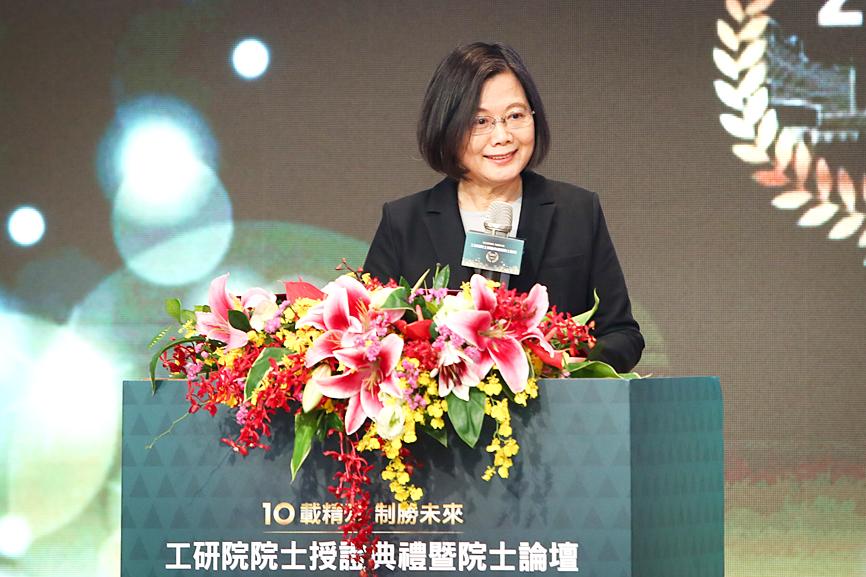The passage of a referendum seeking to ban imports of pork containing traces of the feed additive ractopomine could undermine Taiwan’s bid to join the Comprehensive and Progressive Agreement for Trans-Pacific Partnership (CPTPP), as it could be interpreted as a lack of determination to embrace free trade, President Tsai Ing-wen (蔡英文) said on Tuesday.
“This is the most important display of willpower [for Taiwan], in which a country’s determination is examined,” Tsai said during a podcast in which she detailed the government’s opposition to a referendum slated for Dec. 18.
The referendum asks voters: “Do you agree that the government should prohibit imports of pork, offal or other related products that contain the beta agonist ractopamine?”

Photo: CNA
While the question does not connect ractopomine pork with US pork, Tsai urged the public to vote “No” in the referendum, saying that whether Taiwan allows such imports from the US would be scrutinized by the world as it weighs the nation’s willingness to open its markets.
All of the CPTPP’s 11 signatory countries have approved the import of such products from the US, and they will be checking if Taiwan is prepared to clear difficult hurdles to comply with the world’s high-standards in free trade, she said.
The Chinese Nationalist Party (KMT), which initiated the referendum in an attempt to overturn the government’s decision to lift the ban on pork imports containing ractopamine at the beginning of this year, has said such an argument is irrelevant as the US is not a CPTPP member.
Domestically, Taiwan still bans the use of the drug, which is used to enable animals to grow larger and leaner, for both cattle and hogs.
Tsai said that the long-stalled Trade and Investment Framework Agreement between Taiwan and the US was able to resume thanks to the government’s announcement that it would open up to US pork products.
In addition, subsequent trade talks have provided both sides with an ideal platform through which other differences can be resolved, allowing Taiwan to narrow the gap with the US on a range of issues, she said.
Council of Agriculture Minister Chen Chi-chung (陳吉仲) on Tuesday said that as Taiwan is heavily dependent on trade, the passage of the referendum would showcase the nation’s reluctance to comply with “international standards” and put it at a disadvantage in free-trade agreement negotiations with the US.
No country in the world has left food safety issues to a referendum, Chen said, adding that the initiative is politically motivated.

The Grand Hotel Taipei on Saturday confirmed that its information system had been illegally accessed and expressed its deepest apologies for the concern it has caused its customers, adding that the issue is being investigated by the Ministry of Justice Investigation Bureau. The hotel said that on Tuesday last week, it had discovered an external illegal intrusion into its information system. An initial digital forensic investigation confirmed that parts of the system had been accessed, it said, adding that the possibility that some customer data were stolen and leaked could not be ruled out. The actual scope and content of the affected data

DO THEY BITE IT? Cats have better memories than people might think, but their motivation is based entirely around the chance of getting fed Cats can remember the identity of the people who fed them the day before, Taipei-based veterinarians said on Friday, debunking a popular myth that cats have a short memory. If a stray does not recognize the person who fed them the previous day, it is likely because they are not carrying food and the cat has no reason to recognize them, said Wu Chou Animal Hospital head Chen Chen-huan (陳震寰). “When cats come to a human bearing food, it is coming for the food, not the person,” he said. “The food is the key.” Since the cat’s attention is on the food, it

‘LIKE-MINDED PARTNER’: Tako van Popta said it would be inappropriate to delay signing the deal with Taiwan because of China, adding he would promote the issue Canadian senators have stressed Taiwan’s importance for international trade and expressed enthusiasm for ensuring the Taiwan-Canada trade cooperation framework agreement is implemented this year. Representative to Canada Harry Tseng (曾厚仁) in an interview with the Central News Agency (CNA) said he was increasingly uneasy about Ottawa’s delays in signing the agreement, especially as Ottawa has warmed toward Beijing. There are “no negotiations left. Not only [is it] initialed, we have three versions of the text ready: English, French and Mandarin,” Tseng said. “That tells you how close we are to the final signature.” Tseng said that he hoped Canadian Prime Minister Mark Carney

President William Lai (賴清德) yesterday bestowed one of Taiwan’s highest honors on Saint Vincent and the Grenadines (SVG) Ambassador Andrea Clare Bowman in recognition of her contributions to bilateral ties. “By conferring the Order of Brilliant Star with Grand Cordon on Ambassador Bowman today, I want to sincerely thank her, on behalf of the Taiwanese people, for her outstanding contribution to deepening diplomatic ties between Taiwan and SVG,” Lai said at a ceremony held at the Presidential Office in Taipei. He noted that Bowman became SVG’s first ambassador to Taiwan in 2019 and